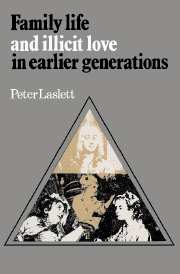Book contents
- Frontmatter
- Contents
- Introduction: the necessity of a historical sociology
- 1 Characteristics of the Western family considered over time
- 2 Clayworth and Cogenhoe
- 3 Long-term trends in bastardy in England
- 4 Parental deprivation in the past: a note on orphans and stepparenthood in English history
- 5 The history of aging and the aged
- 6 Age at sexual maturity in Europe since the Middle Ages
- 7 Household and family on the slave plantations of the U.S.A.
- Bibliography
- Index
6 - Age at sexual maturity in Europe since the Middle Ages
Published online by Cambridge University Press: 12 September 2009
- Frontmatter
- Contents
- Introduction: the necessity of a historical sociology
- 1 Characteristics of the Western family considered over time
- 2 Clayworth and Cogenhoe
- 3 Long-term trends in bastardy in England
- 4 Parental deprivation in the past: a note on orphans and stepparenthood in English history
- 5 The history of aging and the aged
- 6 Age at sexual maturity in Europe since the Middle Ages
- 7 Household and family on the slave plantations of the U.S.A.
- Bibliography
- Index
Summary
Age at sexual maturation is of obvious interest to historians of the family. It is the point at which offspring begin to be as big in body and as strong as those who gave them birth, a transformation of the situation which had hitherto controlled to such a large extent the relationship between the parent and the child. It determines, therefore, the point at which children reach the crisis of adolescence and begin the process of asserting their independence from their parents and from the family of origin generally. This circumstance was of far greater significance in earlier societies, where physical size and strength counted for much more.
But puberty, as everyone knows, has further emotional and physiological consequences. It marks a stage at which the young adult becomes capable of full sexual intercourse, and, for the women, of experiencing menstruation. Both of these stages of development are often of crucial psychological significance. Moreover, it introduces the possibility of procreation, which immediately implies stringent social control. No society at any period, whatever its resources, can allow individuals to reproduce at will. But puberty is a precondition of marriage itself, as well as of illegitimacy and the other irregularities in procreation which were discussed in some detail in chapter 3. In most societies known to me – certainly in all societies belonging to the Christian tradition, and perhaps in almost every other society, too – sexual maturation is an essential preliminary to marriage for both sexes.
- Type
- Chapter
- Information
- Family Life and Illicit Love in Earlier GenerationsEssays in Historical Sociology, pp. 214 - 232Publisher: Cambridge University PressPrint publication year: 1977
- 1
- Cited by



